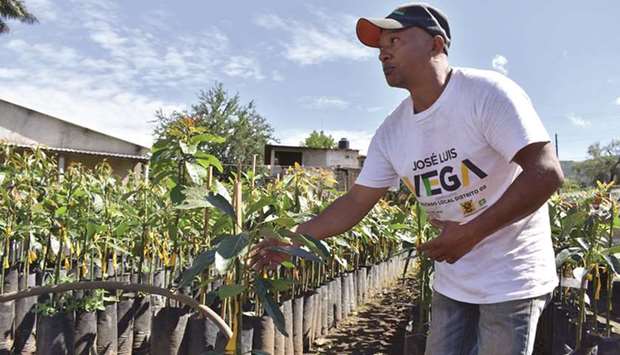The smell of moist earth and fresh resin from pine and oak trees hangs heavy in the air in Michoacan. Nature in this western Mexican state comes in lush green tones and so does the region’s most lucrative fruit, the avocado.
Michoacan is one of the largest avocado-growing regions in Mexico. And while the fruit’s boom in worldwide popularity has brought money to the growing region, it’s also caused problems for the environment.
According to the United Nations Food and Agriculture Organisation (FAO), the amount of agricultural land dedicated to growing avocado around the world grew from 381,000 hectares in 2006 to 564,000 hectares in 2016.
A large part of that land is in Mexico, where the avocado originates from. Avocado trees are planted in endless uniform rows in the fields around the city of Uruapan.
Nearly 2 million tonnes of avocados have been grown on some 200,000 hectares over the past year. And the surface area used to produce them is still growing. Mexican biologist Arturo Chacon Torres, founder of the campaign group Academia Mexicana de Impacto Ambiental, says avocado plantations continue to stretch into forests and mountain ranges.
It’s estimated that between 600 and 1,000 hectares of forest are being destroyed in the region per year to be turned into agricultural fields. Piles of small woodchips remain as traces of the destruction.
In addition, the fruit requires lots of care to grow properly, especially when it comes to water.
There are multiple small-time avocado growers in the region, several of them working illegally. In 2018, Mexican authorities caught several producers who were illegally felling pine trees in order to use the area to grow avocados.
According to a 2012 Mexican study commissioned by the government, increased avocado production has contributed to a loss in diversity as well as environmental pollution and soil erosion. It has also damaged the natural water cycle and endemic species in the area.
“We are striving to find a balance that allows us to maintain the advantages and income, but also develop a more sustainable form of production,” says Ramon Paz Vega, spokesman for the Mexican association of avocado producers and exports, APEAM. The group supports a reforestation programme, among other initiatives.
According to estimates by the Mexican Agriculture Ministry, global demand for avocados is set to grow about 48.98 per cent from 2017 to 2030. Global consumption is expected to increase from 2.84 million tons to 4.24 million tons per year.
Mexico’s powerful cartels haven’t missed the memo about the avocado’s popularity, organised crime also has its finger in the ‘green gold.’ Producers are often threatened and kidnapped by gang members. Some have formed defence groups and even called on the federal police to intervene. The problem has lessened, but it does still exist.
Mexico isn’t the only country with problems due to the huge growth in demand for the fruit.
In the past few years, more than 110,000 tonnes of avocado were produced and some 65,000 tonnes were exported. The numbers mark a steady rise: In 2016, 101,000 tonnes were produced and 47,000 tonnes exported.
The first avocado trees in this region were brought to what was then Palestine roughly 100 years ago. Today, the green fruit is grown on about 8,500 hectares in, according to the local fruit-growing association. Avocados are a staple of the diet - average consumption is about 5 kilograms per person per year.
In light of the high demand and large profits, more and more growers are increasing the amount of land avocados are grown on. Often, they replace land used to grow citrus fruits, says Marcelo Sternberg, professor of plant ecology at Tel Aviv University.
One possible problem that he foresees, “Avocado trees need lots of water.” A kilogram of avocados requires about 600 litres of water.
“In nature, nothing’s free,” he warns.
The avocado boom has also reached South Africa, especially the north-eastern provinces of Limpopo and Mpumalanga. Those regions enjoy a warm and subtropical climate, and the area used for cultivation has risen steadily since the turn of the millennium; about 1,000 hectares are added every year.
South Africa produced about 120,000 tonnes of avocados in 2017, according to the local association of avocado growers. Ten years earlier, that figure was only 74,000 tonnes. Without artificial irrigation, however, it would not be possible to grow avocados in South Africa.– DPA

LARGEST REGION: Michoacan is one of the largest avocado-growing regions in Mexico. Avocado trees are planted in endless uniform rows in the fields around the city.
